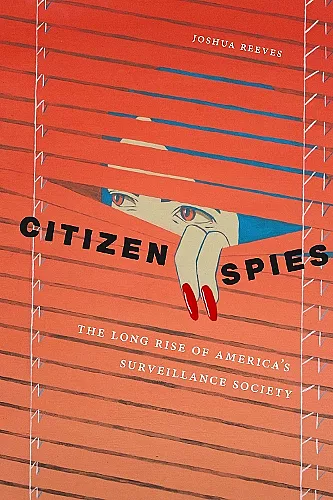Citizen Spies
The Long Rise of America's Surveillance Society
Format:Paperback
Publisher:New York University Press
Published:8th Jan '19
Currently unavailable, and unfortunately no date known when it will be back
This paperback is available in another edition too:
- Hardback£80.00(9781479803927)

The history of recruiting citizens to spy on each other in the United States.
Ever since the revelations of whistleblower Edward Snowden, we think about surveillance as the data-tracking digital technologies used by the likes of Google, the National Security Administration, and the military. But in reality, the state and allied institutions have a much longer history of using everyday citizens to spy and inform on their peers. Citizen Spies shows how “If You See Something, Say Something” is more than just a new homeland security program; it has been an essential civic responsibility throughout the history of the United States.
From the town crier of Colonial America to the recruitment of youth through “junior police,” to the rise of Neighborhood Watch, AMBER Alerts, and Emergency 9-1-1, Joshua Reeves explores how ordinary citizens have been taught to carry out surveillance on their peers. Emphasizing the role humans play as “seeing” and “saying” subjects, he demonstrates how American society has continuously fostered cultures of vigilance, suspicion, meddling, snooping, and snitching. Tracing the evolution of police crowd-sourcing from “Hue and Cry” posters and America’s Most Wanted to police-affiliated social media, as well as the U.S.’s recurrent anxieties about political dissidents and ethnic minorities from the Red Scare to the War on Terror, Reeves teases outhow vigilance toward neighbors has long been aligned with American ideals of patriotic and moral duty. Taking the long view of the history of the citizen spy, this book offers a much-needed perspective for those interested in how we arrived at our current moment in surveillance culture and contextualizes contemporary trends in policing.
"Analyzing citizen-policing initiatives from 'Hue and Cry' posters in 1775 to . . . call-911 programs, author Reeves's cutting insight deconstructs the protocols and policies of what he calls 'America's surveillance society.' [T]his book carefully examines historical accounts and court cases up to present day, and the withering effects of police crowdsourcing on America's dream of security, comfort, and liberty." * Starred Library Journal *
"Reevess larger point is that the array of surveillance and control systems established in American society since theSept.11 attacks is largely dependent on habits of complicity, or at least of acquiescence, that have been a very long time in forming." * Inside Higher Ed *
"This reflective book attempts to explain the use of the & other'to inform our perceptions of how policing is and should be handled." * Choice *
"Citizen Spieslooks at citizens, surveillance, and how the police state conscripts us all. At a moment when citizens are contesting both the repressive and revolutionary potential ofcivic engagement, Reeves analysis of its evolution as a surveillance tool is exceptionally useful." * The New Republic *
"Wonderfully written, Citizen Spies asks us to consider the implications of governing when carried out through the bodies of citizens, particularly through their capacities for surveillance and communication. Examining case studies of U.S. citizens invited to spy on othersfrom D.A.R.E., a program that encourages children to snitch on their parents, to crowdsourcingReeves upends notions of civic duty. Citizen Spies provocatively invites us, in response to the invocation 'if you see something, say something,' to not say anything when we see something: silence as an act of radical resistance." -- Rachel E. Dubrofsky,co-editor, Feminist Surveillance Studies
"Citizen Spies offers a fascinating history of citizen-led policing, as well as partnerships between citizens and police, in order to situate current forms of criminal justice and information sharing through digital media. Timely, engaging, and a pleasure to read, Joshua Reeves provides a much-needed perspective for scholarly and practice-based conversations about policing technologies and surveillance." -- Daniel Trottier,author of Social Media as Surveillance: Rethinking Visibility in a Converging World
"In an age where surveillance studies tends to focus on digital systems and technologies, Joshua Reeves's excellent work reminds us of thelong duree of governance through the recruitment of citizens as extensions of police.This deep expedition into peer to peer spyingmeticulously connects seeing to saying, observing to reporting, and ultimately surveillance to communication.Citizen Spiestakes us on a rollicking ride where we discover that our neighbors are as integral as the devices in snoop and snitch culture." -- Jack Z. Bratich,author of Conspiracy Panics: Political Rationality and Popular Culture
"Joshua Reevess groundbreaking book explores the myriad ways in which looking out for one another has come to mean monitoring one another in the name of security and public safety. It is a cautionary tale for an era of interactive populism about how people have come to actively participate in their own submissionand how this could be otherwise. In this respect, it is an urgently important contribution to our understanding of the pitfalls and potentials of contemporary citizenship." -- Mark Andrejevic,Pomona College
ISBN: 9781479878116
Dimensions: unknown
Weight: 363g
256 pages